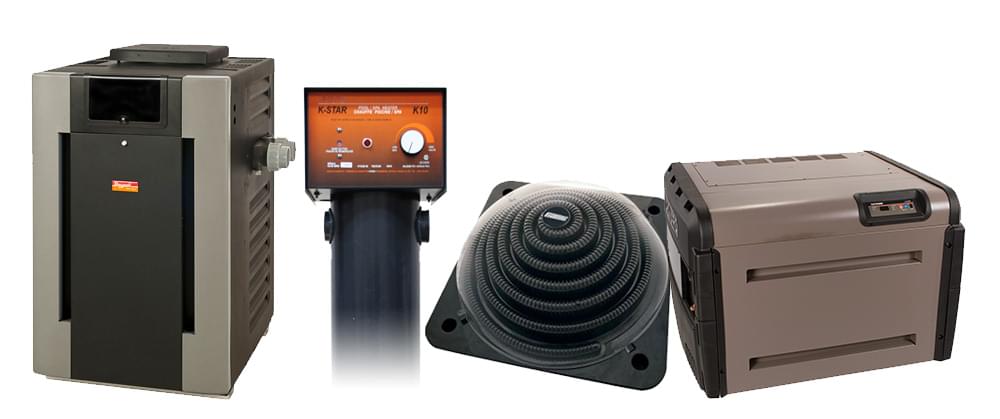
If you’re a Canadian and you have a pool you should consider getting a pool heater! With a pool heater you will be able to swim more months of the year and later into the evening. Extending your pool season just makes sense, but with a variety of heaters on the market it is important to first consider which will work best for your pool. Here are some of the factors you should consider before choosing your pool heater.
1. Size Matters
Consider the size of your pool and the size of your heater as well as temperature you’re aiming for. A simple rules of thumb is that a large pool requires a larger heater (but keep in mind that a larger heater will cost more to operate).
The following chart will act as a guideline, but it’s still a good idea to talk to a specialist at Pool Supplies Canada if you’re unsure.
| Pool Size |
Gas Heater Size |
Heat Pump Size |
K-Star Heater Size |
| 15' Round |
100,000 - 130,000 BTU |
50,000 - 70,000 BTU |
5KW |
| 18' Round |
100,000 - 130,000 BTU |
50,000 - 70,000 BTU |
10KW |
| 21' Round |
100,000 - 130,000 BTU |
50,000 - 85,000 BTU |
10KW |
| 24' Round |
100,000 - 150,000 BTU |
50,000 - 110,000 BTU |
10KW |
| 27' Round |
175,000 - 250,000 BTU |
100,000 - 120,000 BTU |
15KW |
| 30' Round |
250,000 - 300,000 BTU |
110,000 - 140,000 BTU |
15KW |
| 12' x 24' |
100,000 - 150,000 BTU |
70,000 - 85,000 BTU |
5KW |
| 14' x 28' |
150,000 - 200,000 BTU |
70,000 - 85,000 BTU |
10KW |
| 16' x 32' |
200,000 - 250,000 BTU |
110,000 - 120,000 BTU |
10KW |
| 18' x 36' |
250,000 - 300,000 BTU |
110,000 - 120,000 BTU |
15KW |
| 20' x 40' |
300,000 - 400,000 BTU |
120,000 - 140,000 BTU |
15KW |
2. Consider Your Power Source
Your heater choice will also be influenced by the power source that best fits your backyard. There are natural gas heaters, propane heaters, solar heaters, electric heaters and heat pumps.
Natural Gas Heaters have been widely used because they heat pools quickly, operate independently of air temperature, and are relatively inexpensive to purchase. However, they have declined in popularity because of rising gas costs and because they emit air pollutants. Also, if you live in an area where natural gas isn’t available, then a gas heater won’t be an option.
Propane Heaters work quickly to heat your pool to the perfect temperature. Propane heaters are inexpensive to purchase, and are arguably the most reliable pool heaters available on the market. However, like natural gas heaters they are not as environmentally friendly and are more expensive to install than solar and electric heaters.
Solar Heaters are in some ways the inverse of a natural gas or propane heater. After the initial expense they have no operating costs because the energy they use is gathered by solar panels. The initial costs of a solar heater are offset by the long life of the heater. They are environmentally friendly, but can be slow to heat your pool, and do not operate as efficiently when cloudy.
Electric heaters use electricity to heat a resistor which in turn heats the water. Usually these are used in smaller pools. These have the benefit of being environmentally friendly and relatively inexpensive, but have larger operating costs.
Heat pumps transfer heat from the air in to the water, almost like an air conditioner in reverse. Heat pumps are energy efficient as well as environmentally friendly. However, they can take a while to heat up, and heat pumps are dependent on the surrounding air temperature. Although initially expensive to purchase, they are inexpensive to operate (approximately 3-6 times less then an equivalent natural gas or propane model) and can last from ten to twenty years.
3. Do You Need a New or Replacement Heater?
New heaters may require some additional installations to your home. For example, solar heaters may require the installation of solar panels. Gas heaters may require the installation of a new gas line, which in some cases can be a large undertaking. The upside of new gas lines is that it affords you more flexibility in the size of your new heater.
When purchasing a replacement heater, it is important to make note of the specifications of your old heater. Having information about your heater is important whether you are replacing it with one powered by a new energy source or by the same.
Ultimately, every heater has advantages and disadvantages. So it is important to weigh your options and prioritize the features most important to you. If you plan on heating your pool frequently a higher end unit with lower maintenance cost may work best. Or, if you’re using your pool less frequently then consider a more affordable, lower maintenance model.
This Blog was Posted on October 6th, 2016
Any Offers, Prices or Product Line Ups Mentioned on this Page are Subject to Change Without Notice

